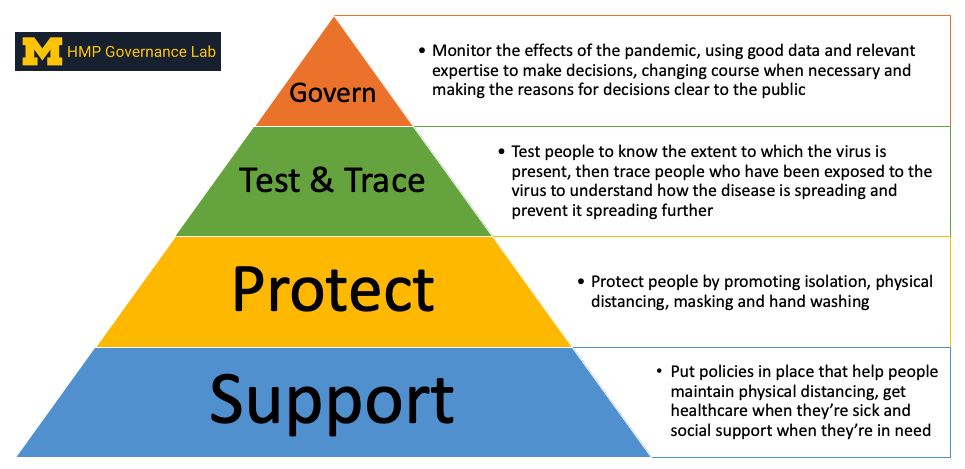
The Health Management & Policy Governance Lab analyzes politics and policymaking to understand how these factors contribute to our health.

Political Culture and Lockdown Policy
Liberal democracies, like most European countries and the United States, have a cultural aversion to lockdowns and the sacrifices necessary to make them effective.

Partisanship and geography- How elites talk about public health emergencies in the United States
What do politicians really care about when it comes to public health emergencies? We find that their parties and their districts are what matter.

Children’s health care access in the US- four years going backwards
Children’s health care access in the United States has seen massive strides but since 2016 conservative state and federal government policies have led to an increase in the number of uninsured children.

PHE, RIP- The botched elimination of England's public health agency is just a symptom
The hasty mid-pandemic reorganisation of England’s public health agency is just another symptom of broader problems in UK governance.

The welfare state is not enough: Lessons about inequality from Chile's 2019 crisis
Chile impressed everybody with what a centrist government could do, not least expanding health care. So why the riots of 2019?

Deny and distract: The Populist Radical Right responses of Trump, Johnson and Bolsonaro to COVID-19
Health is not a good issue for populist radical right politicians, and so it is unsurprising, if tragic, that they consistently try to change the topic rather than address the problem.

We are failing to plan for overlapping disasters -and they are already here
When natural disasters strike during a pandemic, potential harms -to the population and to ethnic or racial minority groups in particular- are compounded. Yet we are failing to account for this in our disaster preparedness planning.

Schools must consider students’ mental health when planning active shooter drills
Active shooter drills can help students feel more prepared, but our findings show that they can also have a negative effect on students’ emotional wellbeing.

What should governments do to tackle the COVID-19 pandemic?
To address the COVID-19 pandemic, governments need to do four things. Unfortunately, many are failing to adequately govern, test and trace, protect against the spread of the disease or support those in need through health and social policies.

Is Europe…getting it right?
The EU’s response to the COVID-19 pandemic has improved considerably since March. But how much longer term transformation will we see in EU public health and health systems policies, and for what purpose?

A governance explainer: What does TAPIC stand for and where did it come from?
Confused about governance? You need this explainer on governance and how to use the TAPIC framework to analyze it.

Four years on, Brexit negotiations still risk damaging the UK’s NHS
All forms of Brexit are likely to have negative consequences for health in the UK, but some forms are worse than others. Our latest paper looks at the current negotiating positions of the UK and EU and the prospects for a deal by the end of the transition period.

Translating Federal COVID-19 policy
In the absence of a widely administered vaccine, analysis remains one of our most important tools in addressing the coronavirus pandemic. In the US, responding to the COVID-19 pandemic requires subnational governments to analyze their own local readiness to relax (or increase) restrictions. These efforts require three kinds of data: on the spread of disease, on the effects of the disease across the population and on the available infrastructure to test, trace and treat.

COVID-19 is making civil society more important than ever, but also more fragile.
The European response to COVID-19 relies heavily on civil society organizations. But the pandemic also highlights the sector’s vulnerabilities.

Don’t Balk this Balkan: Why Greece was an outlier in the EU’s COVID-19 Response
The success of Greece in responding to the COVID-19 pandemic should not be a surprise. It came about through leadership, not luck.

The EU’s fiscal governance has created a European mezzogiorno. Shared debt could offer a way out.
Rather than stabilizing the EU, policies to govern the public spending of EU countries have entrenched a divide between northern and southern Europe. The new proposals from the European Commission could bridge this divide and prevent it from widening further.

Antibody Tests and Regulatory Reforms: Why Delegating Pre-Market Control to Private Companies is a Bad Idea
Europe’s experience with regulating medical devices shows why allowing companies to bring antibody tests to market without regulatory approval could do more harm than good.

What we can learn from COVID-19 transition planning in Europe?
European countries are relaxing their physical distancing measures in some of the same ways as US states, but with more social policy support.

Who are the ‘vulnerable’ when it comes to COVID-19?
For variable physical distancing measures to work as a defense against COVID-19, we need to rethink the term ‘vulnerable population’.

Why is governance important for responding to COVID-19?
The best policy ideas for tackling the pandemic won’t work unless they are supported by effective governance.
